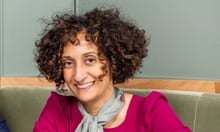More than one in five people in the West Midlands do not use the internet, the highest rate in the UK, analysis has revealed, raising fears over the impact of digital exclusion during the pandemic.
Analysis of Ofcom data for Good Things Foundation found 21.7% of people in the West Midlands were internet “non-users”, meaning they either do not use or do not have access to the internet, while a further 23.3% were limited internet users.
The figure is significantly higher than the proportion of internet non-users nationally, which is 15%.
The north-east also has a high digital exclusion rate, with 53% of the population completely offline or with limited internet use, compared with London and the south-east where the figure stands at 35%.
The analysis, conducted by Prof Simeon Yates of the University of Liverpool, found 11.4 million people in the Midlands, the north-east, the north-west and Yorkshire and the Humber are either offline (3.9 million) or use the internet in a very limited way (7.8 million).
Helen Milner, the chief executive of Good Things Foundation, said: “More than 21% of people in the West Midlands are non-users of the internet. That means one in five are being excluded from learning, working and applying for work or for benefits.
“The Covid-19 pandemic has exacerbated a digital divide that was already there – in education, and also for parents and adults. This cannot continue, and we need to act now. Tackling digital exclusion is hugely important for local communities and for the economy as a whole.”
The West Midlands combined authority has partnered with Good Things Foundation to tackle the problem, and in a digital roadmap published last week said it was a developing a coalition to work with local authorities, the third sector and community groups on the issue. The West Midlands mayor, Andy Street, said the strategy would “ensure all our citizens are equipped to play a full part in, and benefit from” digital connectivity.
Liam Byrne, the MP for Birmingham Hodge Hill and the Labour candidate for West Midlands mayor, said: “For the West Midlands to thrive economically, culturally and socially, we need to be at the forefront of the digital revolution. Our region, languishing bottom of the internet usage league table, is cause for real concern.
“We need to supercharge teaching of online tech and coding in our schools, reverse a decade of cuts to adult education, and target support in those hard-to-reach communities which have yet to make it online at all. Investing in online literacy, community internet access and affordable broadband will help fix this problem.”










